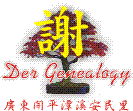

We don't have a lot of information on him but from data on hand and knowledge of Chinese customs we can make certain deductions. Firstly, it is safe to say that Xie Wingshui was born in 1883 or there about. His second daughter and fourth child, Der She Chow, was born in 1911. Males at that time were generally married between the age of 16 and 20. If we take the medium age and assume he was married at 18. There seems to be a pattern of a child every other year. Then in 1911 he would have been 28 which means he was born in 1883.
From here we can establish the approximate year of his arrival in Canada. If they were to go overseas and work another common practice for them to leave at the age of 14 or slightly older. This means Xie Wingshui arrived in Canada around 1897 and paid the prevailing $50 head tax.
From what we know, he stayed in the BC Lower Mainland area and worked in the vegetable farms. Since this was seasonal work thus he would returned to China during the off-seasons to save on the living expenses. He may not had made the trip every year but at least every other year.
During WWI he again returned to China. He stayed as long as permitted by his Canadian traveling paper. Made his way to Hong Kong to catch the steamship for the journey to Canada. However, the better ships were requested by the government for the war effort. After seeing the rust bucket masqueraded as passenger ship and recalled the soothsayer's warning, he decided to postpone his return journey to Canada. Earlier a fortune teller had warned he would die away from home. In seeing the ship's condition, he decided not to tempt fate.
Safety was a compelling reason for him to wait but there are cultural reasons also. To the Chinese, especially those of the older generations, the concept of "fallen leaves return to the root (╴╴質╴╴甇豢╴╴)" is of utmost important. This is based upon the true home-grown Chinese religion, ancestor worship. In ancient time not worship one's ancestors was cause enough for the a leader's removal. Chinese history is littered with references of appointing a male heir to ensure the offerings were made at the appropriate times. It became the unspoken obligations to make offerings to one's ancestors om all important occasions and to visit the grave sites at least twice a year, Spring and Autumn, for offerings and maintenance. Because of poor transportation and the associated high cost people die while traveling most likely wouldn't be buried in the family or clan's ancestral burial ground and have their graves tended to.
Unfortunately, during the War most ships were requisitioned by the government and commercial ships were few and far in between. Consequently Xie Wingshui missed the return deadline on his travelling Canadian paper. He started to sell seedings at Taishan City (╴╴啣╴╴) which is in another county but not far from his village. All was well until 1939 when the Japanese invasion finally reached the area. One of the Japanese tactics was to bomb local cities and towns. He was caught in one of these daytime raids and killed. Thus in a way he met fate on the road he took to avoid it.